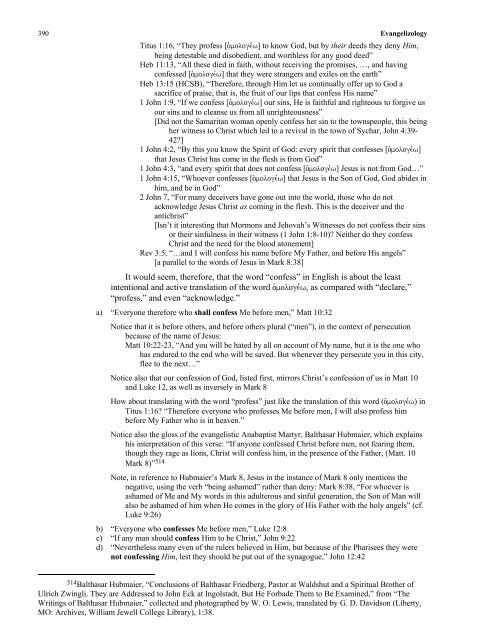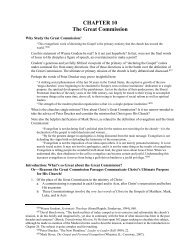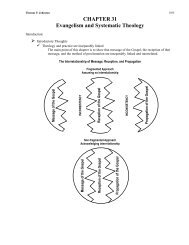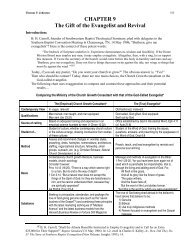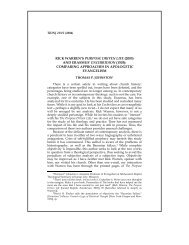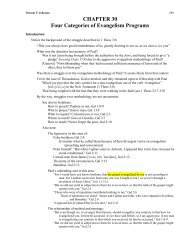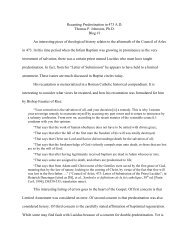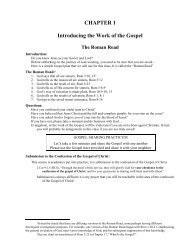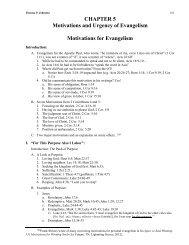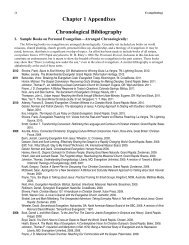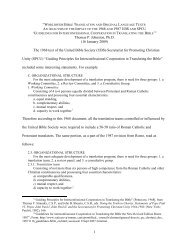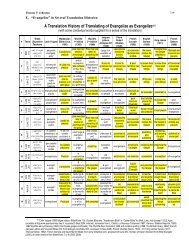CHAPTER 7 Defining Evangelizing - Evangelism Unlimited
CHAPTER 7 Defining Evangelizing - Evangelism Unlimited
CHAPTER 7 Defining Evangelizing - Evangelism Unlimited
Create successful ePaper yourself
Turn your PDF publications into a flip-book with our unique Google optimized e-Paper software.
390 Evangelizology<br />
Titus 1:16, “They profess [o`mologe,w] to know God, but by their deeds they deny Him,<br />
being detestable and disobedient, and worthless for any good deed”<br />
Heb 11:13, “All these died in faith, without receiving the promises, …, and having<br />
confessed [o`mologe,w] that they were strangers and exiles on the earth”<br />
Heb 13:15 (HCSB), “Therefore, through Him let us continually offer up to God a<br />
sacrifice of praise, that is, the fruit of our lips that confess His name”<br />
1 John 1:9, “If we confess [o`mologe,w] our sins, He is faithful and righteous to forgive us<br />
our sins and to cleanse us from all unrighteousness”<br />
[Did not the Samaritan woman openly confess her sin to the townspeople, this being<br />
her witness to Christ which led to a revival in the town of Sychar, John 4:39-<br />
42?]<br />
1 John 4:2, “By this you know the Spirit of God: every spirit that confesses [o`mologe,w]<br />
that Jesus Christ has come in the flesh is from God”<br />
1 John 4:3, “and every spirit that does not confess [o`mologe,w] Jesus is not from God…”<br />
1 John 4:15, “Whoever confesses [o`mologe,w] that Jesus is the Son of God, God abides in<br />
him, and he in God”<br />
2 John 7, “For many deceivers have gone out into the world, those who do not<br />
acknowledge Jesus Christ as coming in the flesh. This is the deceiver and the<br />
antichrist”<br />
[Isn’t it interesting that Mormons and Jehovah’s Witnesses do not confess their sins<br />
or their sinfulness in their witness (1 John 1:8-10)? Neither do they confess<br />
Christ and the need for the blood atonement]<br />
Rev 3:5, “…and I will confess his name before My Father, and before His angels”<br />
[a parallel to the words of Jesus in Mark 8:38]<br />
It would seem, therefore, that the word “confess” in English is about the least<br />
intentional and active translation of the word o`mologe,w, as compared with “declare,”<br />
“profess,” and even “acknowledge.”<br />
a) “Everyone therefore who shall confess Me before men,” Matt 10:32<br />
Notice that it is before others, and before others plural (“men”), in the context of persecution<br />
because of the name of Jesus:<br />
Matt 10:22-23, “And you will be hated by all on account of My name, but it is the one who<br />
has endured to the end who will be saved. But whenever they persecute you in this city,<br />
flee to the next…”<br />
Notice also that our confession of God, listed first, mirrors Christ’s confession of us in Matt 10<br />
and Luke 12, as well as inversely in Mark 8<br />
How about translating with the word “profess” just like the translation of this word (o`mologe,w) in<br />
Titus 1:16? “Therefore everyone who professes Me before men, I will also profess him<br />
before My Father who is in heaven.”<br />
Notice also the gloss of the evangelistic Anabaptist Martyr, Balthasar Hubmaier, which explains<br />
his interpretation of this verse: “If anyone confessed Christ before men, not fearing them,<br />
though they rage as lions, Christ will confess him, in the presence of the Father, (Matt. 10<br />
Mark 8)” 514<br />
Note, in reference to Hubmaier’s Mark 8, Jesus in the instance of Mark 8 only mentions the<br />
negative, using the verb “being ashamed” rather than deny: Mark 8:38, “For whoever is<br />
ashamed of Me and My words in this adulterous and sinful generation, the Son of Man will<br />
also be ashamed of him when He comes in the glory of His Father with the holy angels” (cf.<br />
Luke 9:26)<br />
b) “Everyone who confesses Me before men,” Luke 12:8<br />
c) “If any man should confess Him to be Christ,” John 9:22<br />
d) “Nevertheless many even of the rulers believed in Him, but because of the Pharisees they were<br />
not confessing Him, lest they should be put out of the synagogue,” John 12:42<br />
514 Balthasar Hubmaier, “Conclusions of Balthasar Friedberg, Pastor at Waldshut and a Spiritual Brother of<br />
Ulrich Zwingli. They are Addressed to John Eck at Ingolstadt, But He Forbade Them to Be Examined,” from “The<br />
Writings of Balthasar Hubmaier,” collected and photographed by W. O. Lewis, translated by G. D. Davidson (Liberty,<br />
MO: Archives, William Jewell College Library), 1:38.


